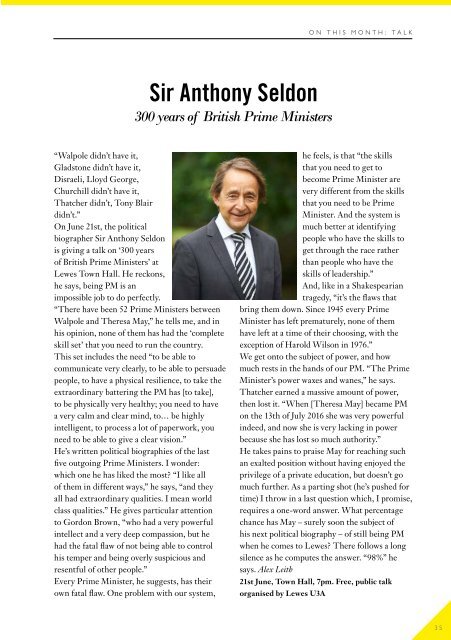Viva Lewes Issue #153 June 2019
Create successful ePaper yourself
Turn your PDF publications into a flip-book with our unique Google optimized e-Paper software.
ON THIS MONTH: TALK<br />
Sir Anthony Seldon<br />
300 years of British Prime Ministers<br />
“Walpole didn’t have it,<br />
Gladstone didn’t have it,<br />
Disraeli, Lloyd George,<br />
Churchill didn’t have it,<br />
Thatcher didn’t, Tony Blair<br />
didn’t.”<br />
On <strong>June</strong> 21st, the political<br />
biographer Sir Anthony Seldon<br />
is giving a talk on ‘300 years<br />
of British Prime Ministers’ at<br />
<strong>Lewes</strong> Town Hall. He reckons,<br />
he says, being PM is an<br />
impossible job to do perfectly.<br />
“There have been 52 Prime Ministers between<br />
Walpole and Theresa May,” he tells me, and in<br />
his opinion, none of them has had the ‘complete<br />
skill set’ that you need to run the country.<br />
This set includes the need “to be able to<br />
communicate very clearly, to be able to persuade<br />
people, to have a physical resilience, to take the<br />
extraordinary battering the PM has [to take],<br />
to be physically very healthy; you need to have<br />
a very calm and clear mind, to… be highly<br />
intelligent, to process a lot of paperwork, you<br />
need to be able to give a clear vision.”<br />
He’s written political biographies of the last<br />
five outgoing Prime Ministers. I wonder:<br />
which one he has liked the most? “I like all<br />
of them in different ways,” he says, “and they<br />
all had extraordinary qualities. I mean world<br />
class qualities.” He gives particular attention<br />
to Gordon Brown, “who had a very powerful<br />
intellect and a very deep compassion, but he<br />
had the fatal flaw of not being able to control<br />
his temper and being overly suspicious and<br />
resentful of other people.”<br />
Every Prime Minister, he suggests, has their<br />
own fatal flaw. One problem with our system,<br />
he feels, is that “the skills<br />
that you need to get to<br />
become Prime Minister are<br />
very different from the skills<br />
that you need to be Prime<br />
Minister. And the system is<br />
much better at identifying<br />
people who have the skills to<br />
get through the race rather<br />
than people who have the<br />
skills of leadership.”<br />
And, like in a Shakespearian<br />
tragedy, “it’s the flaws that<br />
bring them down. Since 1945 every Prime<br />
Minister has left prematurely, none of them<br />
have left at a time of their choosing, with the<br />
exception of Harold Wilson in 1976.”<br />
We get onto the subject of power, and how<br />
much rests in the hands of our PM. “The Prime<br />
Minister’s power waxes and wanes,” he says.<br />
Thatcher earned a massive amount of power,<br />
then lost it. “When [Theresa May] became PM<br />
on the 13th of July 2016 she was very powerful<br />
indeed, and now she is very lacking in power<br />
because she has lost so much authority.”<br />
He takes pains to praise May for reaching such<br />
an exalted position without having enjoyed the<br />
privilege of a private education, but doesn’t go<br />
much further. As a parting shot (he’s pushed for<br />
time) I throw in a last question which, I promise,<br />
requires a one-word answer. What percentage<br />
chance has May – surely soon the subject of<br />
his next political biography – of still being PM<br />
when he comes to <strong>Lewes</strong>? There follows a long<br />
silence as he computes the answer. “98%” he<br />
says. Alex Leith<br />
21st <strong>June</strong>, Town Hall, 7pm. Free, public talk<br />
organised by <strong>Lewes</strong> U3A<br />
35


















